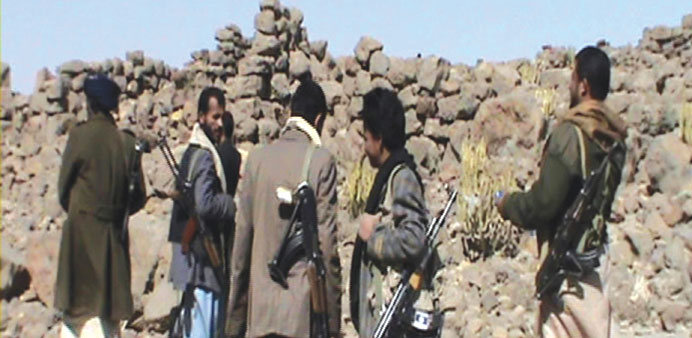AFP/Sanaa
Shia Houthi rebels have overrun strongholds of powerful tribes in northern Yemen, witnesses said yesterday, in a major advance following a month of combat that has killed scores of people.
The rebels have been pushing out from the mountains of the far north to areas closer to Sanaa to expand their hoped-for autonomous unit in a promised federal Yemen.
In another indication of the growing unrest in the country, a German citizen kidnapped in the capital on Friday is being held in a tribal region of the eastern Marib province, a foreign ministry official said yesterday.
The Houthis seized the town of Huth and Khamri village—the seat of the Hashid tribal chief—as tribal defence lines crumbled, local sources and witnesses said.
The Houthis “completely took over the regions of Huth and Khamri”, rebel spokesman Mohamed Abdulsalam said by telephone.
“Members of Hashid backed by takfiris (Sunni extremists) have fled.”
Tribal chief sheikh Hussein al-Ahmar ordered his fighters to evacuate his family’s farm in Khamri and set it ablaze, witnesses said, adding that the tribesmen have retreated to neighbouring areas.
The witnesses saw dozens of horses and vehicles fleeing from the farm and said scores of tribesmen were captured by the advancing rebels.
The violence in Amran province dates back to January 5, and dozens of people have been killed in the fighting, including 60 on Friday alone.
The capture of Khamri represents a severe blow to the powerful Ahmar clan, which leads the Hashid.
Divisions within the Hashid tribe could have contributed to the defeat, sources said, pointing out that some have sided with the Houthis.
The division is a result of an ongoing dispute between the Hashid chief sheikh Sadeq al-Ahmar and former president Ali Abdullah Saleh, who also belongs to the vast Hashid tribe.
Ahmar had sided with nationwide Arab Spring protests that forced Saleh to step down in February 2012 after 33 years in power.
In addition to taking on the northern tribes, the Shia Houthis have also been battling Sunni Salafists who established religious schools in parts of the north.
The Houthis have accused the Salafists of bringing foreign extremists into their region.
Mediators dispatched by President Abd-Rabbu Mansour Hadi have succeeded in brokering ceasefires in several areas, but some of the truces have broken down.
The Houthis, named after their late leader Abdel Malek al-Houthi, are part of the Zaidi Shia community.
They rose up in 2004 against Saleh’s government, accusing it of marginalising them politically and economically.
Hadi has pledged that Yemen will adopt a federal constitution in a bid to address local grievances that have fuelled violence across the Arab world’s poorest country.
But at a ceremony last month to mark the conclusion of a troubled 10-month national dialogue, he put off any decision on the thorny issue of how many components it will have, promising that a special commission will decide.
In the southern province of Daleh yesterday, authorities said they foiled a car bomb attack on the provincial governor’s offices.
Soldiers blew up the vehicle 200m from the building, a provincial official said, quoted by the Saba state news agency, blaming southern militants for the foiled attack using a car filled with explosives and shells.
In the hostage incident, a German man in his 60s was kidnapped on Friday by a Yemeni man who is pressing authorities to release his two detained sons, the foreign ministry official said.

A picture taken by a mobile phone shows fighters of the Ahmar tribe somewhere in Omran province in northern Yemen yesterday.
